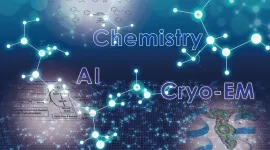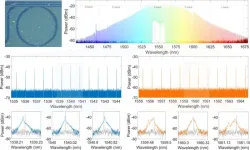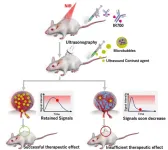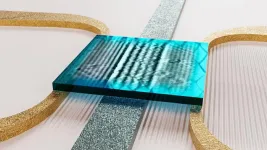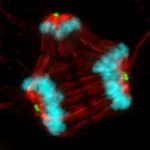(Press-News.org) Researchers at Nagoya University in Japan created and improved artificial intelligence (AI) designs to synthesize a candidate compound for a new gastric acid inhibitor with a better binding affinity than existing drugs. Their findings, published in Communications Biology, suggest a new way to work in tandem with AI to develop pharmaceuticals.
Stomach acid is a crucial component of food digestion. However, when the balance of gastric mucosal secretion is disturbed, stomach acid can cause discomfort and, in severe cases, conditions such as gastric ulcers and reflux esophagitis. Therefore, many people turn to gastric acid suppressants, most of which target the gastric proton pump responsible for gastric acid secretion. These drugs help neutralize stomach acid, providing relief for people suffering from heartburn and related conditions.
A collaborative research group led by Associate Professor Kazuhiro Abe and Professor Satoshi Yokoshima of the Graduate School of Pharmaceutical Sciences at Nagoya University, in collaboration with Intage Healthcare Corporation and the SPring-8 radiation facility, took a novel approach to drug development. They focused on the steric structure of the gastric proton pump, a complex protein structure in the stomach lining that transports the H+ protons that make up HCl, the acid that makes up gastric acid. They analyzed it using "Deep Quartet," an artificial intelligence-driven drug discovery platform.
Using the AI, the researchers designed new candidate compounds with unique chemical structures to effectively target the gastric proton pump. The team aimed to identify compounds that could simultaneously bind to multiple sites on the proton pump, enhancing the overall effectiveness of the drug. They chemically synthesized these candidate compounds and analyzed their binding structures to proteins using cryo-electron microscopy. Then, the compounds were further modified to improve their binding ability.
The researchers used AI to generate more than 100 candidate compounds with unique chemical structures. Expert chemists and structural biologists then selected the most promising candidates for synthesis and tested how strongly they bound and inhibited the gastric proton pump, ultimately revealing that the sixth compound synthesized (DQ-06) exhibited stronger binding than existing reference compounds.
Despite initial reservations, the technology won Abe over. “I was skeptical when I saw some of the strange chemical structures, including DQ-02 (the second one they tested) and related ones,” he said. “But we suspected there must be a reason AI suggests such strange chemicals. We noticed that the first had a narrow binding site compared to the second, so we realized that AI was quite ‘honest’ in its approach, designing for the given binding site, which is flexible.”
Furthermore, to gain insights into the binding mechanism, the research group employed cryo-electron microscopy to visualize the molecule's interaction with the gastric proton pump. They discovered that there was room for further improvement in the binding strength. Based on this knowledge, a new compound, DQ-18, was synthesized by introducing a chlorine atom into DQ-06, resulting in even stronger binding.
“While the results confirmed that the compound was bound as expected, we found that there was still some room between the binding pocket of the compound and the protein,” Abe said. "If we fill these gaps, the compound will fit more 'snugly' into the pocket, resulting in stronger bonding".
This innovative approach led to the creation of a compound with a binding affinity nearly 10 times higher than that of SCH28080, a prototype compound for gastric acid inhibitors. Abe believes that this shows the importance of the synergy between humans and AI in drug discovery. “We can see AI being useful for creating treatments, but not completely or automatically”, he said. “We used AI for structure-based drug design, which we humans are not so good at. But we chose real candidates to synthesize, and indeed we improved it with our own hands. We efficiently used AI for what we are not good at. But I believe, at least for the time being, human knowledge is ultimately required to make any final decision.”
Their research represents a significant step forward in the development of pharmaceuticals, promising more efficient and reliable treatments for gastric acid-related conditions and inspiring fresh approaches to drug discovery. The collaboration between researchers and artificial intelligence showcases the potential of AI to revolutionize the world of medicine and improve human health as a collaborative tool alongside scientists.
END
Scientists build on artificial intelligence to create next-generation gastric acid treatment
2023-10-27
ELSE PRESS RELEASES FROM THIS DATE:
Is it possible for random bit generator to reach a rate of Peta bits/s?
2023-10-27
The optical frequency comb is an important tool in modern physics research and applications. In 2005, Theodor W. Hänsch and John L. Hall were awarded the Nobel Prize in Physics for their pioneering work on optical frequency comb technology. This sparked a great interest among researchers in the field, leading to a series of studies on optical frequency combs. Advanced nanophotonic technology has enabled integrated microresonators with ultrahigh Q factors and chip-scale microcombs. Among various comb dynamic states, a chaotic comb has high nonlinearity. In a chaotic comb, each comb tooth exhibits a chaotic dynamic ...
A new NIR-PIT biomarker paves the way for targeted cancer treatments
2023-10-27
Researchers at Nagoya University in Japan and their collaborators have used a biomarker based on microbubbles to evaluate the success of near-infrared photoimmunotherapy (NIR-PIT) treatment. Using ultrasound to track the microbubbles, they were able to identify areas where cancer therapy had not been fully applied. Their findings suggest ways to improve NIR-PIT and make it a viable alternative treatment for various types of cancer.
NIR-PIT is an innovative cancer treatment that combines the use of antibodies and near-infrared light to ...
Number of dementia cases could be 42% higher than previously estimated by 2040
2023-10-27
Up to 1.7 million people could be living with dementia in England and Wales by 2040 – over 40% more than previously forecast – finds a new UCL-led study.
Previous studies, based on data up to 2010, showed that dementia incidence had declined in high-income countries. However, the new research, published in The Lancet Public Health, indicates that dementia incidence started to increase in England and Wales after 2008.
Based on this estimated upward incidence trend, researchers project that the number of people with dementia in England and Wales may be significantly higher than expected in the future.
According to previous research* in England ...
Youngest children in class with ADHD as likely to keep diagnosis in adulthood as older pupils, find scientists
2023-10-27
Lancet Psychiatry study shows for first time that younger children are no more likely to lose ADHD diagnosis over time than older classmates
Experts in charge of study examined data from more than 6,500 patients with ADHD
360 million people worldwide have been diagnosed with the condition according to WHO – with around a third under the age of 18
Children who are the youngest in their class to be identified with ADHD are just as likely to keep the diagnosis as older pupils in their year group, scientists have found.
Experts from the University of Southampton ...
Effective treatment for rare sight-threatening infection
2023-10-27
A drug candidate, based on pioneering UCL and Moorfields Eye Hospital research and currently under development by SIFI S.p.A., has been found to be highly effective in treating a rare sight-threatening eye infection in a new international clinical trial.
The findings, published in Ophthalmology, describe the efficacy and safety of the first drug candidate for the treatment of Acanthamoeba keratitis (AK), applying a novel and evidence-based treatment protocol.
AK is one type of microbial keratitis (corneal infection) – a condition ...
Controlling waves in magnets with superconductors for the first time
2023-10-27
Quantum physicists at Delft University of Technology have shown that it’s possible to control and manipulate spin waves on a chip using superconductors for the first time. These tiny waves in magnets may offer an alternative to electronics in the future, interesting for energy-efficient information technology or connecting pieces in a quantum computer, for example. The breakthrough, published in Science, primarily gives physicists new insight into the interaction between magnets and superconductors.
Energy-efficient substitute
"Spin waves are waves in a magnetic material that we can use to transmit information," explains ...
$1.5 million DOD grant will create virtual reality test to assess TBI in the field
2023-10-27
One of the most common injuries sustained by military personnel in recent conflicts has been traumatic brain injury, or TBI. In response to this, and the fact that military operations are increasingly being conducted by small teams in far-flung areas, researchers in the University of Arizona College of Medicine – Tucson’s Department of Psychiatry are working on a portable virtual reality system to assess TBI in the field.
Psychiatry professor William “Scott” Killgore, PhD, and his team in the Social, ...
Antibody-drug conjugate helps patients with metastatic non-small cell lung cancer live longer, delaying disease progression
2023-10-27
Treatment with datopotamab deruxtecan (Dato-DXd), a novel Trop-2 directed antibody-drug conjugate, was found to significantly improve progression-free survival in patients with metastatic non-small cell lung cancer, an improvement that was primarily driven by patients with non-squamous tumors.
These results from the TROPION-Lung01 Phase III trial, which compared the standard of care in second-line docetaxel, a type of chemotherapy, with Dato-DXd, an antibody drug conjugate, in patients with pretreated metastatic non-small cell lung cancer, were presented at the European Society for Medical Oncology 2023 Congress by Dr. Aaron ...
UTHSC cancer researcher part of $3 million collaborative project studying obesity-related cancer
2023-10-27
A University of Tennessee Health Science Center (UTHSC) researcher is a member of a prestigious team that has just received a highly competitive Endeavor Award totaling $3 million from The Mark Foundation for Cancer Research.
Liza Makowski, PhD professor in Hematology and Oncology at the UTHSC Center for Cancer Research, is a co-principal investigator on the award, which funds collaborative projects tackling complex challenges in the prevention, diagnosis, and treatment of cancer. Entitled “Inflammatory Drivers of The Obesity-Cancer Connection”, the project is led by principal ...
Common chemotherapy drugs don't work like doctors thought, with big implications for drug discovery
2023-10-27
A new study from the University of Wisconsin–Madison suggests that chemotherapy may not be reaching its full potential, in part because researchers and doctors have long misunderstood how some of the most common cancer drugs actually ward off tumors.
For decades, researchers have believed that a class of drugs called microtubule poisons treat cancerous tumors by halting mitosis, or the division of cells. Now, a team of UW–Madison scientists has found that in patients, microtubule poisons don't actually stop cancer cells from dividing. Instead, these drugs alter ...
